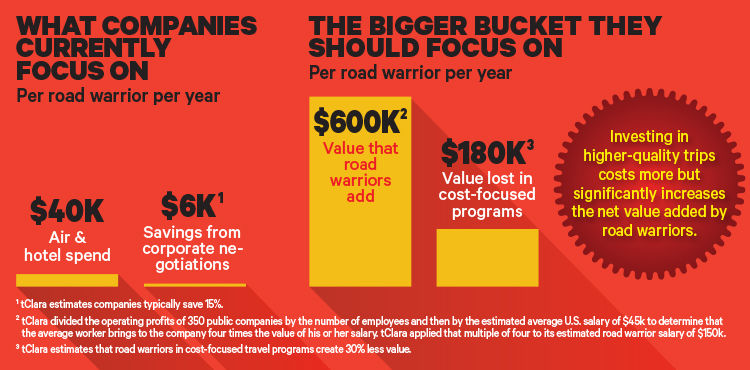Among the things travel buyers care about, savings is
arguably the most essential, the most visible, the most measured. Savings,
defined here as the gap between published and negotiated price, is at the heart
of most negotiations; it is procurement’s guiding light. It’s been this way for
the past 20 years, and we take its god-like status for granted. But savings is
a false god, leading its worshippers down the wrong path.
Three Evils of Savings
Capturing savings builds false confidence. More
savings does not mean safer, healthier or more productive travel. Just the
opposite. Research shows that compared with traveler-focused programs,
cost-focused programs produce 22 percent fewer effective trips, 12 percent more
wasted trips and less productive and more stressed travelers with higher
attrition risks. Any savings achieved pales in comparison to these much higher
costs.
Savings is a lazy substitute for value. Awarding
contracts based on savings lets travel buyers duck the hard job of measuring
the quality and value of their suppliers. Using savings as a proxy for value
does a disservice to most every supplier.
Savings has no financial value. Budget owners and
travelers spend money, so they care about prices, not savings. Their worlds
would not change one bit if savings were never reported. Let that sink in.

A Radical Thought Experiment
Imagine that your management suddenly forbids you to report
savings—no year-to-date savings, no net effective savings rates, no average
discounts, nada. How would you show the value of your travel program? For those
who think that challenge is frightening, have faith, for it can be done.
Think first about what really matters to the travel budget
owners. They want to keep their travelers safe, healthy, productive and
engaged. They want to hire good candidates quickly for their open road warrior
positions. They want good returns on their travel spend. Getting that return
means negotiating good prices, of course, but price negotiations pale compared
with getting good results from the trip. Trip outcomes matter far more than
trips.
Travel buyers have the chance to reinvent their category goals,
strategies and careers by focusing on trip effectiveness. Ditto for the travel
management companies. There is a much brighter future ahead for anyone who can
increase the effectiveness of a program’s trips.
Measure & Manage What Matters
What should you measure, other than savings, to show the
value of a well-managed travel program? Consider these metrics, all of which
should be benchmarked:
- Price paid (prices definitely matter; savings
don’t)
- Traveler friction
- Trip scrap rate
- Trip success rate
- Road warrior attrition rate
- Weeks needed to fill an open road warrior
position
- Road warrior health index
- Traveler risk index (a mix of destination risk
and traveler preparedness)
Once you measure these types of metrics, you’ll
learn their drivers, all of which open a new frontier for managing what really
matters.